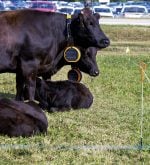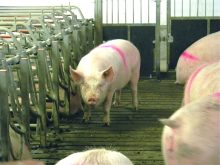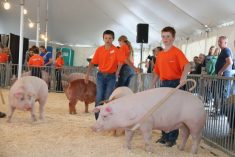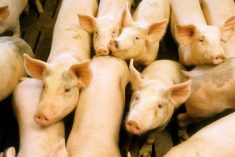Just when Ontario swine farmers and veterinarians think they are gaining the upper hand on disease, nature throws another curveball.
Porcine Reproductive and Respiratory Syndrome (PRRS) is making more pigs sick quicker and no longer arrives only in certain seasons. Porcine Epidemic Diarrhea (PED) is running through Ontario barns , and a new swine flu moved across the province last year.
Why it matters: Swine diseases are a major drain on hog farm income and are an animal and human welfare concern.
Read Also

Dissolving eartags could make pig traceability easier
A dissolving eartag for market hogs, called Clean Trace could reduce processing challenges and enable more individual management of pigs.
Dr. Ryan Tenbergen, a veterinarian with Demeter Veterinary Services, told attendees of the recent South Western Ontario Pork Conference in Ridgetown that the new strain of swine influenza, H3N2 Clade 2010.1, became the dominant strain in Ontario in the nine months after it appeared in April 2023.
“It was a unique virus and it wasn’t genetically similar to anything else,” says Tenbergen.
The influenza appeared in southern Ontario and moved 200 kilometres to the Kincardine area in six weeks.
The strain hasn’t been seen in any other Canadian provinces but is the dominant strain in the U.S. after showing up in 2014. It isn’t necessarily more pathogenic, but it has had a severe impact due to pigs’ lack of immunity.
The influenza strain causes cough, lethargy and fever and is generally treated with anti-inflammatories and sometimes antibiotics.
Pigs are great mixing vessels for influenza because they have receptors for all sorts, whether from birds, people or other pigs.
So far this year, there’s been larger occurrences of PED and delta coronavirus in the province, with 16 cases. There are four cases of PED in sow barns already, whereas there were five cases in the province in all of 2023 and that was considered high.
From sow barns, piglets move to weaning facilities and eventually to finishing facilities, so the likelihood of disease spread is high. Hog trailers are a risk area, says Tenbergen, so more care must be paid to biosecurity and disinfection.
PRRS cases were also worse in January than they have been in two years.
There are new PRRS strains in the U.S. that are infecting pigs more easily and more severely.
“I don’t want to call what’s happening in the U.S. scary, but it’s scary,” he said.
Research pigs, with top care and biosecurity, usually aren’t affected severely by PRRS, but Tenbergen says “we’re starting to see some of that now in some of the research units in the U.S.”
Some swine groups are depopulated when some of these strains.
The U.S. Midwest is the most pig-dense region in North America and pigs there have multiple strains and types of disease, so there are more opportunities for new strains to form.
“We’ve had PRRS for 20 years and we’re still trying to figure it out.”
Seneca virus is another disease to watch for as it shows up as snout lesions, similar to foot and mouth disease.
The first clinical case appeared in Canada in 2019 and there was one case in January in Quebec, connected to assembly yards. About 30 per cent of pigs in Brazil and the U.S. will test positive for the disease and Tenbergen expects it would be similar in Canada.
“I think new things, these viruses, maybe new viruses will continue to challenge how we raise pigs. It’s a really good time to revisit our biosecurity on the farm,” he says.













